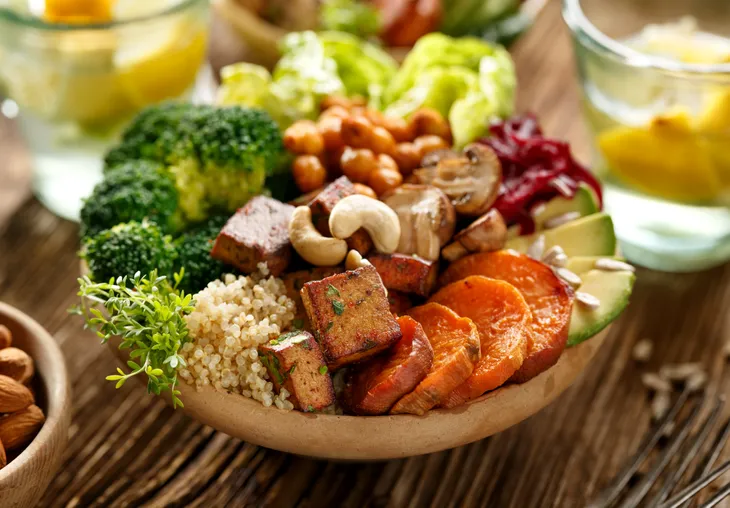Fostering sustainable food systems is an urgent global priority. Sustainable diets are a part of food systems with important implications for human and environmental health.
While definitions of sustainable diets are still evolving, increasing plant-based protein consumption is a common theme among recommendations, including Canada’s Dietary Guidelines and the EAT-Lancet Report.
Plant-based proteins are protein-containing foods that come from plants instead of animals. Common plant-based proteins include foods such as beans, nuts, seeds and tofu.
Despite this increased global and national focus on sustainability, not very many of us are eating a sustainable diet — only five per cent of Canadians have indicated that they follow a plant-based diet and just 14 per cent of Canadians reported eating legumes on any particular day.
Benefits of eating more plant proteins
Adding more plant-based proteins to your diet can provide multiple benefits. Key among these include:
- Improving your health. Canada’s Dietary Guidelines recommend eating plant-based proteins, which tend to contain higher quantities of fibre and lower amounts of unhealthy fats compared to animal-based foods. Research shows that plant-based protein intake is associated with a reduced risk of death from cancer, heart disease and all causes.
- Improving the health of the planet. Eating more plant-based proteins can also help protect the environment. For example, in high-income countries like Canada, consuming a balanced, low-meat diet can reduce the environmental impacts of the food system by lowering emissions of greenhouse gases, use of nitrogen and phosphorous fertilizers, and use of land and water.
- Reducing your grocery bill. According to the Canada Food Price Report 2022, the cost of food is predicted to rise by five to seven per cent this year. Although food prices vary across Canada, plant-based proteins such as beans and tofu are typically more cost-effective compared to animal-based proteins like red meat. By purchasing plant-based proteins more often, you may reduce your grocery bill despite the rising costs of food.
Where to start?
If plant-based eating is associated with significant benefits, why aren’t we consuming more plant-based foods? While there are many factors that influence eating habits, a key barrier relates to food literacy. Our research shows that people are unsure how to prepare plant-based proteins.
To address this barrier, we developed a cookbook to support Canadian families in replacing some of their animal-based proteins with plant-based proteins.
Our free online cookbook, Plant-based proteins: Recipes made easy-peasy!, was created in collaboration with Health Canada, George Brown College and the Canadian Nutrition Society. The first section of the cookbook is an educational resource that provides information about plant-based proteins. The second half includes delicious, easy to prepare, family-friendly recipes.
While some recipes are solely plant-based, others introduce plant-based proteins alongside animal-based foods, ensuring that there are recipes everyone will enjoy!
Tips from our cookbook that may help you to start adding more plant-based proteins into your diet include:
- Try a “Meatless Monday.” Meatless Mondays can be helpful for starting your plant-based journey by encouraging you to plan one day a week when you try a plant-based meal. Check out our lentil Bolognese pasta recipe for inspiration.
- Add some plant-based proteins alongside more familiar animal-based foods. This is a helpful approach for those who hope to try to eat more plant-based foods without completely removing meat from their meals. For example, our beef and bean burger is a tasty option that provides both animal protein and plant-based goodness.
- Replace highly processed snack foods with a plant-based option. Homemade snacks like our chocolate chip puff bars are a delicious source of fibre and protein, without the extra sugar and salt that is often found in processed snack foods. The fibre and plant-based protein in our puff bars will help keep you feeling full and satisfied between meals. They are sure to be a lunch box favourite!
- Replace red meat with more environmentally friendly animal protein, like chicken or turkey. The carbon emissions from chicken and turkey production are much lower than those of their red meat counterparts. Not only are these proteins better for the planet, they are also better for our bodies. Chicken and turkey are leaner proteins and contain less unhealthy fat than most red meats. Give turkey a try and warm up with a big batch of turkey chili. Leftovers can be frozen for a quick meal on a busy day.
Finding strategies that can work in your home to increase plant-based proteins can be a delicious and easy way to improve your health and the health of the planet, as well as to save money at the grocery store.
Katherine Eckert, Ph.D. Candidate & Registered Dietitian , University of Guelph; Jess Haines, Associate Professor of Applied Nutrition, University of Guelph, and Sarah Wedde, MSc Candidate & Registered Dietitian, University of Guelph
![]()
This article is republished from The Conversation under a Creative Commons license. Read the original article.





